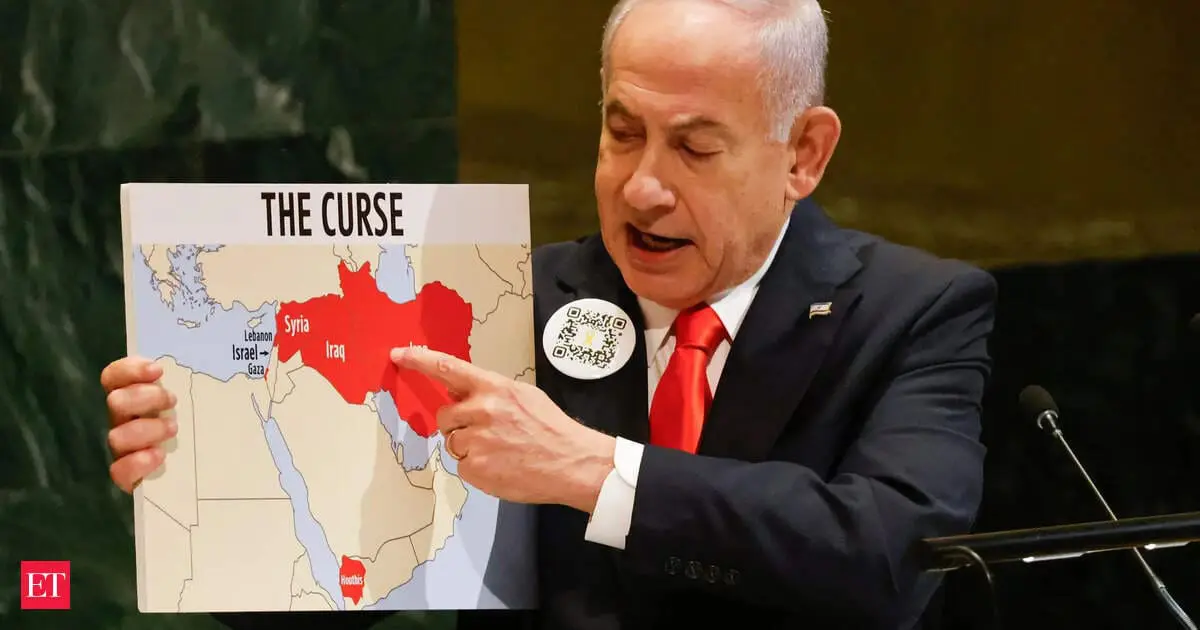New Delhi: In a powerful address at the United Nations, Israeli Prime Minister Benjamin Netanyahu reaffirmed Israel’s commitment to its military campaign against Hamas in Gaza while assuring hostages that they remain a priority. He reflected on the devastating attack of October 7, 2023, by Hamas that resulted in the loss of 1,200 Israeli lives as well as the ongoing conflict’s toll on Gaza, where over 65,000 people have reportedly died. Netanyahu’s speech, met with mixed reactions from attendees, emphasized the enduring memory of the tragedy for Israel.
Netanyahu’s Resolute Stand at the UN
In a significant appearance at the United Nations, Israeli Prime Minister Benjamin Netanyahu vowed to continue Israel’s war against Hamas, emphasizing that those held captive by the Palestinian militants are never forgotten. Speaking in Hebrew, Netanyahu stated, “We’ve not forgotten you – not even for a second.” His message was aimed at both the hostages and the global community, reminding them of the harrowing events that transpired on October 7, 2023, when Hamas launched an unprecedented attack on Israel, resulting in the loss of around 1,200 Israeli lives and the taking of hostages, with 48 still believed to be in Gaza.
Netanyahu’s speech not only underscored the personal tragedy of the hostages but also reinforced Israel’s military objectives. He detailed the Israeli victories against Hamas and other Iranian-backed militant groups while painting a grim picture of the situation in Gaza. “Much of the world no longer remembers October 7. But we remember,” he stated, clearly aiming to keep the memory of the attack fresh in the minds of international leaders and delegates.
The Human Cost of Conflict
The military response from Israel has been severe and devastating. According to local health officials in Gaza, over 65,000 people have lost their lives due to the ongoing conflict, with vast sections of the territory left in ruin. This staggering figure sheds light on the human cost of the military campaign and presents complex questions about the humanitarian crisis developing in Gaza. As the casualties mount, international attitudes towards Israel’s actions have become increasingly polarized, further complicating diplomacy in the region.
As Netanyahu spoke, a range of reactions flooded the room. While many diplomats applauded him with a standing ovation, scores of other delegates walked out in protest. This division highlights the escalating tensions not only within the Israeli-Palestinian conflict but also in the global discourse surrounding it. The chasm in responses reflects varying perspectives on how to address violence and governance in the region.
International Implications
The ongoing situation in Gaza has ramifications that extend far beyond Israel and Palestine. Nations around the world, as well as international organizations like the United Nations, are increasingly challenged to mediate and offer solutions that are equitable and just. As countries grapple with their positions on this complex issue, public opinion continues to shift dramatically based on emerging information and the evolving crisis.
Netanyahu’s address comes at a time when many global powers are questioning their alliances and policies in the Middle East. The calls for humanitarian support and ceasefires by numerous countries highlight a strong desire for peace, juxtaposed against the stark realities of ongoing military engagements. The rhetoric employed by leaders such as Netanyahu adds layers to these complex discussions, as differing narratives clash on the world stage.
What This Means for Civilians in Conflict Zones
Understanding the conflict from a civilian perspective can provide clearer insight into its profound impacts. For the families living in Gaza, the ongoing military assaults lead to severe hardships in everyday life. Access to basic necessities such as food, water, and medical care has become increasingly limited.
Real-world examples illustrate how civilians cope under such duress. Organizations in Gaza are working tirelessly to deliver humanitarian aid, although they often face logistical challenges due to ongoing hostilities. Many families have had to make the devastating choice to leave their homes, often ending up in overcrowded shelters that lack adequate resources and safety. It’s crucial for the international community to not only focus on diplomatic solutions but also to improve the living conditions for those caught in the crossfire of this prolonged conflict.
| Fact | Number |
|---|---|
| Israeli lives lost since October 7 | 1,200 |
| Hostages held by Hamas | 48 |
| Estimated Palestinian lives lost in Gaza | 65,000+ |
As the international community navigates this complex geo-political landscape, it is imperative to remain focused on humanitarian needs while seeking resolutions that ensure peace and protection for all involved.
Bankerpedia’s Insight 💡
The ongoing conflict in Gaza, as highlighted by Netanyahu’s recent address, not only underscores geopolitical tensions but also poses significant risks to global markets, including India’s banking and finance sector. Investors are increasingly wary of instability in the Middle East, which could lead to fluctuations in oil prices and impact the Indian economy. For readers, remaining informed about these developments is crucial; consider diversifying investments and staying updated on global economic indicators that could influence local markets. Keeping a close watch on risk factors will help in making sound financial decisions during turbulent times.
What Does This Mean for Me? 🤔
| If I am a… | The Impact is… |
|---|---|
| Salaried Person | Increased geopolitical tensions may affect job security. |
| Business Owner | Increased geopolitical risk could affect business stability. |
| Student | Increased concern over global conflicts and safety issues. |
| Self-employed | Increased instability may disrupt self-employed income sources. |
| Homemaker | Increased uncertainty and concern for family safety. |
| Retiree / Senior Citizen | Increased geopolitical instability may affect retirement security. |
| Job Seeker | Increased uncertainty regarding job security in affected regions. |
| Farmer / Rural Citizen | Increased insecurity and instability for farmers and rural citizens. |
Research References 📚
Loved our Research? ❤️
Bankerpedia turns financial confusion into clarity!
Want the latest banking insights, money tips, and financial hacks delivered straight to your WhatsApp? Just send ‘Hi’ – it’s that simple, and you’ll never miss a smart update again!










